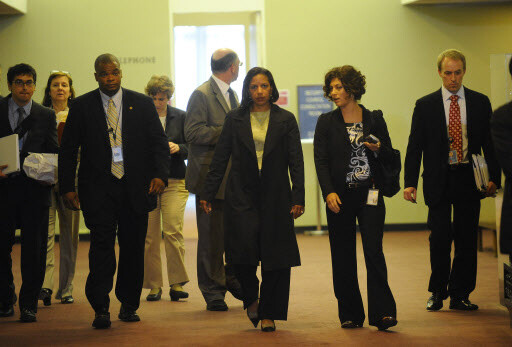hankyoreh
Links to other country sites 다른 나라 사이트 링크
[Analysis] Experts forecast a gloomy June for Korea’s already unstable peninsula

The instability of the Korean Peninsula seems to be getting gloomier. Diplomacy has been caught in a cycle of confrontation since North Korea fired a long-range rocket on April 5, and tensions are on a continuous high in this situation in which one never knows if someone might pull the trigger. Experts meanwhile are saying that a forecast for the month of June is impossible, however, indicate that a United Nations Security Council (UNSC) resolution to impose sanctions on North Korea, the South Korea-U.S. summit in Washington on June 16, and North Korea’s launch of an intercontinental ballistic missile (ICBM) or an accidental clash in the West Sea will serve as major factors.
From the perspective of projecting a forecast, the problem is that all these factors could very possibly be bearish ones that trip up everyone. Firstly, the UNSC resolution for sanctions on North Korea is expected to be stronger than Resolution 1708, which was passed in October 2006. It appears the core content of the current resolution will be financial sanctions on North Korea. In the case of 2006 sanctions, North Korea responded by readying additional nuclear tests, but China mediated, and in accordance with a tripartite agreement between North Korea, China and the U.S., the six-party talks were restarted and things proceeded towards negotiations.
This time may prove to be different, however. In a telephone discussion on May 26 with U.S. President Barack Obama, South Korea President Lee Myung-bak conveyed that he wanted to rule out negotiations. Lee stressed that the international community compensated North Korea after its first nuclear test in October 2006 with a resumption of dialogue. In order to prevent a repeat of this pattern, Lee said the international community needed to work together closely. He suggested that it would be a mistake for the U.S. to negotiate.
This point of view that looks at negotiations not as a tool for resolving problems but as a reward meshes with the conservative hardline view in the U.S. The hardline response of the Lee Myung-bak administration, which has displayed itself in South Korea’s full participation in the U.S.-led Proliferation Security Initiative (PSI) and its push for the U.S. to make clear its provision of its nuclear umbrella, reveals its understanding that North Korea must surrender and come forth for dialogue. This provides a reason for the difficulty in anticipating that the South Korea-U.S. summit on June 16 will produce a message for a peaceful resolution of the North Korea nuclear issue through dialogue and negotiations.
One former high-ranking South Korean official who requested anonymity said Monday that the South Korean government was attempting to narrow the position of the Obama administration by giving justification for a hardline response to North Korea. A U.S. Defense Department official said Saturday at the Asia Security Conference in Singapore that the goal of the U.S. was the denuclearization of the Korean Peninsula, indicating wariness of rising calls within South Korea to pursue its own nuclear sovereignty.
If a narrow path to strong sanctions by the UNSC is pursued, experts have already determined North Korea’s response. For example, they suggest it could push through with a test launch of an ICBM, as it has already announced. It is also very possible North Korea could look for an even stronger way to respond. If North Korea fires a missile, the UNSC could be put in an embarrassing situation at a time when criticism is being raised that sanctions do not work. It may have no other recourse but to level more sanctions, and it will be tough to escape the vicious circle of additional sanctions and additional provocations.
Please direct questions or comments to [englishhani@hani.co.kr]
Editorial・opinion
![[Column] Season 2 of special prosecutor probe may be coming to Korea soon [Column] Season 2 of special prosecutor probe may be coming to Korea soon](https://flexible.img.hani.co.kr/flexible/normal/500/300/imgdb/original/2024/0426/3317141030699447.jpg) [Column] Season 2 of special prosecutor probe may be coming to Korea soon
[Column] Season 2 of special prosecutor probe may be coming to Korea soon![[Column] Park Geun-hye déjà vu in Yoon Suk-yeol [Column] Park Geun-hye déjà vu in Yoon Suk-yeol](https://flexible.img.hani.co.kr/flexible/normal/500/300/imgdb/original/2024/0424/651713945113788.jpg) [Column] Park Geun-hye déjà vu in Yoon Suk-yeol
[Column] Park Geun-hye déjà vu in Yoon Suk-yeol- [Editorial] New weight of N. Korea’s nuclear threats makes dialogue all the more urgent
- [Guest essay] The real reason Korea’s new right wants to dub Rhee a founding father
- [Column] ‘Choson’: Is it time we start referring to N. Korea in its own terms?
- [Editorial] Japan’s rewriting of history with Korea has gone too far
- [Column] The president’s questionable capacity for dialogue
- [Column] Are chaebol firms just pizza pies for families to divvy up as they please?
- [Column] Has Korea, too, crossed the Rubicon on China?
- [Correspondent’s column] In Japan’s alliance with US, echoes of its past alliances with UK
Most viewed articles
- 1[Column] Season 2 of special prosecutor probe may be coming to Korea soon
- 2‘We must say no’: Seoul defense chief on Korean, USFK involvement in hypothetical Taiwan crisis
- 3Is N. Korea threatening to test nukes in response to possible new US-led sanctions body?
- 4Amnesty notes ‘erosion’ of freedom of expression in Korea in annual human rights report
- 5Division commander ordered troops to enter raging flood waters before Marine died, survivor says
- 6N. Korean delegation’s trip to Iran shows how Pyongyang is leveraging ties with Moscow
- 7[Editorial] Korea’s surprise Q1 growth requires objective assessment, not blind fanfare
- 8Is Japan about to snatch control of Line messenger from Korea’s Naver?
- 9No good, very bad game for Korea puts it out of Olympics for first time since 1988
- 10[Reportage] On US campuses, student risk arrest as they call for divestment from Israel